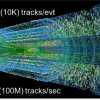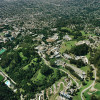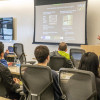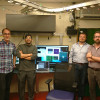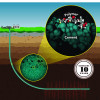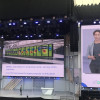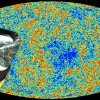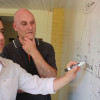News
CRD Post-doc Goes from Medical Devices to Mars Landing
Applied mathematician Mike MacNeil joined the Computational Research Division’s Analytics and Visualization group as a postdoctoral researcher in August 2017, where he is developing new methods and software tools for helping scientists improve their understanding of voluminous and complex, time-varying 3D image-based data acquired by experiments run at Berkeley Lab’s Advanced Light Source. Read More »
Physicists and Machine Learning Experts Team Up to Tackle the TrackML Challenge
Machine learning experts, computer scientists and physicists have partnered with Kaggle on the TrackML Particle Tracking Challenge, a competition designed to inspire the development of an algorithm that can quickly reconstruct particle tracks from 3D coordinates left in silicon particle detectors following millions of particle collisions. Read More »
Exascale the Key to Generating Realistic and Accurate Scenarios of Future Earthquakes
One hundred and fifty years after the last major earthquake struck California’s Hayward Fault, the ECP Communications Team talks to David McCallen, Critical Infrastructure Program Leader at Berkeley Lab. Read More »
Computing Sciences Summer Student Program Draws 90+ Participants
Dozens of college students from around the world will spend the next two months at Berkeley Lab as part of the Computing Sciences Summer Student Program. Read More »
Berkeley Lab Paves the Way for Real-time Ptychographic Data Streaming
What began nearly a decade ago as a Berkeley Lab Laboratory-Directed Research and Development proposal is now a reality, and it is already changing the way scientists run experiments at the Advanced Light Source—and, eventually, other light sources across the Department of Energy complex—by enabling real-time streaming of ptychographic image data in a production environment. Read More »
New Algorithm Enhances Ptychographic Image Reconstruction
Researchers from CAMERA, the University of Texas and Tianjin Normal University have developed an algorithmic model that enhances the image reconstruction capabilities of Berkeley Lab's SHARP algorithmic framework and computer software that is used to reconstruct millions of phases of ptychographic image data per second. Read More »
Self-Healing Cement Could Be a Boon to Oil & Gas Industry
Researchers at the U.S. Department of Energy's (DOE) Pacific Northwest National Laboratory (PNNL) have developed a unique cement that can repair itself in as little as a few hours. Such a product would be a boon to the oil and gas industry; wellbore cement for geothermal applications has a lifespan of only 30 to 40 years, and when the cement cracks, which happens often, repairs can easily top $1.5 million per well. This challenge prompted PNNL chemist Carlos Fernandez and colleagues to create… Read More »
NERSC's Debbie Bard Delivers Google I/O Talk on Machine Learning in Science
NERSC’s Debbie Bard gave a presentation May 10 during Google I/O, Google’s annual developer’s conference, where she talked about how machine learning and deep learning are being used in cosmology to explore the large-scale structure of the universe. Read More »
Planck Collaboration Wins 2018 Gruber Cosmology Prize
The Planck Team—including researchers in Lawrence Berkeley National Laboratory’s (Berkeley Lab’s) Computational Research and Physics divisions—have been awarded the 2018 Gruber Cosmology Prize. Read More »
ACM’s Software System Award Honors Project Jupyter Team
The Project Jupyter team has been honored with an ACM Software System Award for developing a tool that has had a lasting influence on computing. Project Jupyter evolved from IPython, an effort pioneered by Fernando Pérez, a staff scientist in Berkeley Lab's CRD. Read More »







 Instagram
Instagram YouTube
YouTube
